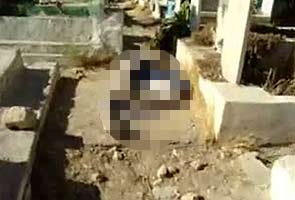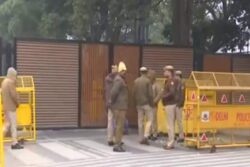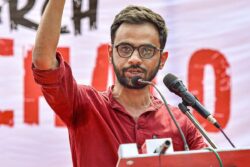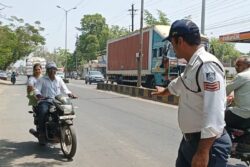Syria accused of ‘massacre’ as hundreds of bodies found

Several hundred bodies have been found in a town near Damascus after a ferocious assault by the Syrian army, a watchdog said Sunday, as activists accused government forces of a gruesome “massacre”.
 A grisly video issued by opposition militants showed bodies piled up wall-to-wall in a mosque complex in Daraya after a massive offensive by troops battling to crush insurgents who have regrouped in the outskirts of the capital.
A grisly video issued by opposition militants showed bodies piled up wall-to-wall in a mosque complex in Daraya after a massive offensive by troops battling to crush insurgents who have regrouped in the outskirts of the capital.
At least 320 corpses were found on Saturday and Sunday, the victims of a five-day onslaught by the army on rebel fighters in Daraya, the Syrian Observatory for Human Rights said.
The Local Coordination Committees, a network of activists on the ground in Syria, described it as a “massacre” by the regime of President Bashar al-Assad and said people in Daraya had been summarily executed and their bodies burnt.
Human rights groups have accused the regime of committing many atrocities since the uprising against Assad’s government first erupted in March last year, and a UN panel said earlier this month it was guilty of crimes against humanity.
Militants issued a video on YouTube entitled “Massacre at the Abu Sleiman Addarani Mosque in Daraya” showing dozens of bodies lined up in dimly lit rooms.
“An odious massacre committed by the gangs of the Assad regime in the Abu Sleiman Addarani Mosque. More than 150 innocent martyrs fell in a brutal campaign by the criminal gangs against the city,” said the commentary with the video, whose authenticity could not be verified.
State television said Daraya, a mainly Sunni Muslim town of some 200,000 people, was being “purified of terrorist remnants.”
The army claimed to have retaken most of Damascus in late July, after about two weeks of intense fighting across the capital’s southern belt. Most rebel Free Syrian Army fighters were forced out into the nearby countryside, but have since resumed hit-and-run operations, according to activists.
“Our valiant armed forces cleared the town of Daraya of the remnants of armed terrorist groups which committed crimes that traumatised the citizens of the town and destroyed public and private property,” the government newspaper Ath-Thawra said on Sunday.
Activists had described the Daraya offensive as a bid to crush “once and for all” the insurgency in the capital after rebel fighters regrouped to the southern outskirts following an army offensive in the heart of the city last month.
“The criminal regime imposed a blockade and cut off necessary supplies to the town, then subjected it to indiscriminate shelling with heavy weapons and warplanes,” the LCC said in a statement.
“Afterwards the gangs of killers entered the town and carried out summary executions, before dismembering and setting fire to the bodies.”
Reports by activists cannot be independently confirmed because of severe restrictions on media operating in Syria.
At least 183 people were killed nationwide on Saturday, the Observatory said, as the brutal conflict that has convulsed Syria for 17 months showed no signs of abating in the face of deep divisions among world powers.
A report by UN investigators said on August 15 that government forces and their militia allies have committed crimes against humanity and that rebels have also carried out war crimes, although on a lesser scale.
In particular, it held government forces responsible for a massacre in the central town of Houla in May when 108 civilians, including 49 children, were killed in an atrocity that shocked the world.
Saturday’s bloodletting erupted a day after new international envoy Lakhdar Brahimi admitted he was “scared” of the enormity of the task he faces to try to end the increasingly ferocious conflict.
Brahimi, who takes over from former UN-Arab League envoy Kofi Annan next month, held talks with UN leaders in New York on Friday.
But Syria warned Brahimi Sunday not to follow the same path as Annan, with Ath-Thawra accusing the former UN chief of “bowing to US and Western pressure”.
Annan quit earlier this month after the failure of his six-point plan to bring peace, which was left in tatters by the relentless bloodshed and UN Security Council divisions over how to tackle the conflict.
“For Brahimi’s mission to succeed and so that Annan’s experience is not repeated, the envoy must respect the rules approved by Damascus,” Ath-Thawra said.
Damascus had voiced hope last week that Brahimi could pave the way for “national dialogue,” while also suggesting it was ready to discuss Assad’s exit as part of any negotiated solution.
Regime forces also hit rebel-held areas of the battered northern city of Aleppo and several other parts of the country on Saturday.
Rebels said earlier this week they controlled 60 percent of Aleppo but the regime has dismissed the claims and said Thursday the army had recaptured three Christian neighbourhoods, where residents are largely pro-Assad.
Opposition fighters said they were digging in for a war of attrition in Aleppo, the once thriving commercial hub where the regime had warned last month of “the mother of all battles.”
August is already the deadliest single month of the conflict with at least 4,000 people killed, according to the Observatory, while around 25,000 have died since March 2011.
The United Nations puts the death toll at more than 17,000, warning of a major humanitarian crisis with over 200,000 refugees fleeing to neighbouring countries and 2.5 million in need in Syria.
Meanwhile, an Iranian delegation was in Damascus for talks with Syrian officials, after Tehran — the regime’s staunchest ally — said it would submit a plan for ending the conflict to a Non-Aligned Movement summit it is hosting later this week.
Tehran’s initiative comes as its foes in the West seek to ramp up the pressure on Damascus, with Washington and London threatening action if it uses its chemical weapons and Paris voicing support for a partial no-fly zone.





